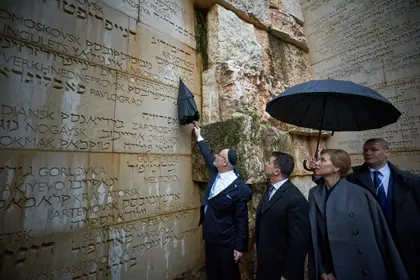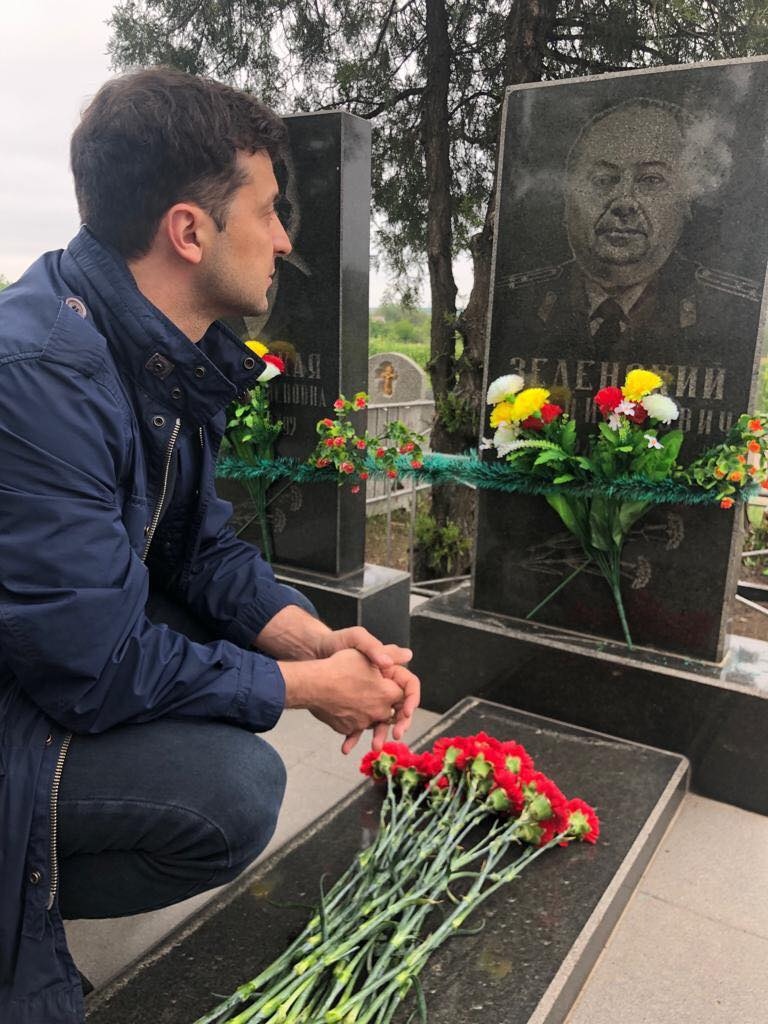Ukrainian President Volodymyr Zelensky rarely talks about his Jewish heritage.
But as the world commemorated the 75th anniversary of the liberation of the Auschwitz-Birkenau death camp, Zelensky shared some family history as he spoke about the courage of people of different ethnicities and religions during the Holocaust.
JOIN US ON TELEGRAM
Follow our coverage of the war on the @Kyivpost_official.
At a briefing with Israeli Prime Minister Benjamin Netanyahu on Jan. 24 in Jerusalem, on the sidelines of commemoration events, Zelensky told the story of four brothers.
- See the most recently published Ukraine news reports from today.
- See the most recently published Ukraine news reports from today.
- Russian Losses
“Three of them and their parents and families were shot dead by Nazi occupants who invaded Ukraine,” Zelensky said. “The fourth brother was fighting at the front. He survived World War II, contributing to the victory over Nazism and its inhumane ideology.
“Two years after the war, he had a son, and in 31 years, he had a grandson. In 40 more years, that grandson became president and he is standing before you today, Mr. Prime Minister.”
Previously, in an interview with the Times of Israel published on Jan. 19, the Ukrainian president told a slightly different version of the family story.
“On my father’s side, my grandfather and his three brothers were all on the front [in the Red Army] in World War II and only he returned,” he told the Times of Israel.
Zelensky said his grandmother lived in Kryvyi Rih, now an industrial city in central Ukraine where the president was born and raised. During the Nazi occupation, she was evacuated to Almaty in Kazakhstan. She studied there to become a teacher. After the war, she returned to Ukraine.
On May 9, 2019, then President-elect Zelensky lay flowers at the grave of his grandfather, Semyon Zelensky in Kryvyi Rih. In a Facebook post, he called the Day of Victory over Nazism “our Thanksgiving Day.”
“Thanksgiving for the fact that the inhumane Nazi ideology is in the past. Thanksgiving to those who fought and defeated Nazism,” he wrote.
Asked about his religion, Zelensky told the Times of Israel that he grew up in “an ordinary Soviet Jewish family” — a non-religious family, since the Soviet authorities promoted atheism and suppressed religion.
“I believe in God,” he said. “But I never speak of God or religion.”
Two other stories Zelensky told Netanyahu focused on a Crimean Tatar Muslim woman, Saide Arifova, and Ukrainian Greek-Catholic priest Omelyan Kovch.
Arifova saved Jewish orphans in Nazi-occupied Crimea by lying to the Germans that the children were Crimean Tatars and giving them Crimean Tatar names. After the liberation of the peninsula, Soviet dictator Josef Stalin ordered the deportation of all Crimean Tatars to Central Asia. Arifova saved those children again by proving that they were actually Jewish.
Arifova herself was sent to Uzbekistan. After the collapse of the Soviet Union, she returned to her native town in Crimea and died in 2007. Her story became the plot of the 2017 film “87 Children.”
Kovch, a priest in the town of Peremyshlyany in Lviv Oblast, was sent to the Majdanek death camp in Poland for giving out nearly 600 baptismal certificates to Jews. In a letter to his six children, he explained why he chose to decline early release from camp: “If I am not here, who will help them go to another world? They will go into eternity with sins.”
“We are all equal here. Poles, Jews, Ukrainians, Russians, Lithuanians and Estonians. I am the only priest here,” he wrote in another letter. Kovch died in 1944 and was beatified by Pope John Paul II in 2001 in Lviv.
Forum, Iran and Putin
Ukraine and Israel share the tragic history of World War II.
Every year in September, Ukraine commemorates the victims of the 1941 massacre at Babyn Yar ravine in Kyiv, where Nazis and local collaborators executed nearly 34,000 Jews, as well as tens of thousands of Ukrainians and Roma people. A Babyn Yar memorial center is under construction in Kyiv.
But history is also a matter of disagreement between the two countries. Ukraine honors some Ukrainian nationalists like Stepan Bandera and Andriy Melnyk as heros. However, historians say their movements also collaborated with the Nazis in mass killings of Jews and Poles in western Ukraine.
The Israeli Embassy in Kyiv has repeatedly criticized efforts to honor Ukrainian nationalists implicated in anti-Semitic violence. Ukraine has also seen several incidents in which Jewish monuments were defaced in recent months.
At the Jan. 24 briefing with Zelensky, Israeli Prime Minister Netanyahu spoke of another enemy of his country: Iran.
Iranian forces shot down a Ukrainian passenger plane on Jan. 8, shortly after it took off from Tehran airport bound for Kyiv. Under international pressure, Iran admitted to mistakenly firing missiles at the plane and killing 176 people on board but blamed the United States for the incident.
Tensions between Iran and the Donald Trump administration in Washington had spiked after the U.S. killed senior Iranian military commander Qassem Soleimani in a drone strike on Jan. 2.
Iran hid the downing of the Ukrainian airliner “for 48 hours before they were forced to admit it. I think it says a lot about what this regime is about,” Netanyahu told Zelensky. “I look forward to discussing with you how we can confront the forces and regimes that threaten our common civilization and our common future.”
The Zelensky’s administration received international praise for its handling of the plane crash. Amid the U.S.-Iran tensions, Ukraine avoided antagonizing the Iranian government and instead sought to cooperate constructively on the investigation of the crash.
Before Zelensky’s trip to Israel, many speculated that the Ukrainian president might meet with his Russian counterpart, Vladimir Putin, on the sidelines of the 5th World Holocaust Forum on Jan. 23.
However, Zelensky decided to give up the Ukrainian delegation’s seats to Holocaust survivors.
Yad Vashem, the Holocaust memorial center that hosted the forum, called the move “puzzling.” The center noted that the event was intended as a gathering of world leaders, not a public memorial ceremony, and over 100,000 Holocaust survivors live in Israel, the Times of Israel reported.
You can also highlight the text and press Ctrl + Enter





